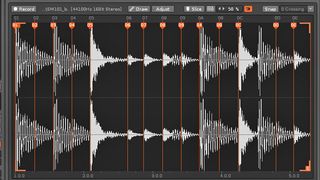

My first thought is the computer in multiple ways. It makes me want to think about this a lot after I’m done writing you my answer. Have there been technologies which have profoundly changed or even questioned the way you make music? I’ve been getting closer to the tech part teaching at CalArts now, but I still feel myself more on the artistic side of it all. Then there are a handful of artists who develop tech and use that in contemporary pieces which inspires other producers to figure out what they’re doing.īut I feel in most cases the technological innovation and the artistic progress are separated in this way.
Renoise sampler set polyphony limit code#
Perhaps the code gets an easy-on-the-eyes UI and tidies everything up into a plugin that is easy to use, or a eurorack module. To me it seems the academic world develops the tools and uses them for some years in a highly academic fashion, but it’s the artists who come along and use or misuse this new tech. Which of these shifts do you rate particularly important for your own music?


Accordingly, there have been musical paradigm shifts accompanied by technological innovation. Historically speaking, there has always been a close relationship between technological and artistic progress. It doesn’t always work but it does help when I feel a bit lazy. This way I can keep some space between all of the elements. That gives me focus on an idea to build on. I’ll first limit myself to one track and only one voice (of polyphony, even though multiple sounds can be used). I’ve had to develop little exercises to keep me in focus and to keep me from just layering too much. I find it makes the most sense if I limit my sound sources to one or two synths for that particular piece of music so that my options are smaller and the ideas can happen faster. The days when technology isn’t working are a total loss so I try to avoid that. I do like to work fast, so I try to have everything ready to go in a good physical position for me to work fast (at arms reach). How would you describe the relationship between technology and creativity for your work? How do you work with your production tools to achieve specific artistic results? Then of course there are the classic pieces, in my case the early Roland xox boxes which I got very cheap back in the day, but still hang on to and use from time to time (TR-808, 909, TB 303, MC 202). As things went on, it became more of a curiosity, but then I would end up with a few pieces that are more or less the same and then I just become paralyzed with options and not knowing what to use for what task. Well, in the beginning it was for something specific as there were no plugins or usually even any samples to find. What motivates you to buy new gear: The curiosity to try new things, a specific function, something else entirely? But there is still quite a list of kit that I am trying to cut down a bit still. So around 2003 I began to buy some new pieces a lot of which didn’t make the cut and were sold.īut at the moment, a few that are really important to me are the Sequencial Prophet 5 (desktop version), Cwejman S1, and my MacbookPro. Then when the tech evolved and VSTs began happening myself and many I know got rid of a lot of our hardware and were totally involved in dsp, however soon after we realized it wasn’t quite the same (these days not so much different). Especially in the days before DAWs, every little piece you acquired would take care of a specific task so it was a really limited way of working. Well at first you just want to get more gear. How and for what reasons has your set-up evolved over the years and what are currently some of the most important pieces of gear for you? This all went through a mixer straight to DAT.
Renoise sampler set polyphony limit mac#
At that time I began collaborating with Arian Leviste who already had a Roland TR-909, Alesis HR-16B, and Juno 106 as well as a Mac running Studio Vision. I bought an Ensoniq EPS with 4x memory expander, Casio CZ-101 and Juno 60. However in 1991 my first little setup started coming together. The very very first idea was a Digitech looper pedal and a 4 track cassette with my turntables. You can also read our Ulrich Krieger interview as well as Ulrich's ideas about alternative tuning systems for some thoughts by his recent collaborator. If you enjoyed this interview with John Tejada and would like to find out more about his music, visit him on Facebook, Soundcloud, Twitter and Bandcamp for current updates and more music. Current Release: John Tejada's "Silversonic", a collaboration with Ulrich Krieger, is out now on Tejada's very own Palette Recordings.


 0 kommentar(er)
0 kommentar(er)
